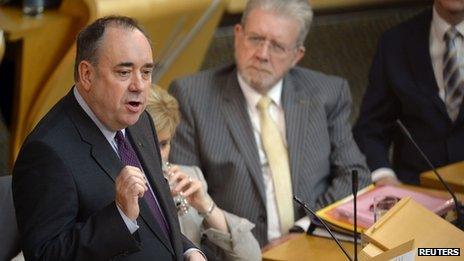Scottish independence: Passion aplenty in Holyrood independence debate
- Published

Mr Salmond aimed to appeal to the heads of voters rather than merely their hearts
Passion aplenty in the independence debate at Holyrood, called to mark the advance anniversary of the referendum. It came, mostly, from the SNP back benches. And from Johann Lamont.
Alex Salmond knows to steer clear of Braveheart rhetoric. He knows that, while it might enthuse the fervent, it can also tend to deter the undecided or the wavering. Of whom, there are plenty.
So his contribution was to argue for independence as part of a continuum: a development of existing devolved powers into all areas of public life. Again, an effort to reassure the fretful.
Mr Salmond argued that devolution had shown that Holyrood could take sensible decisions in line with the consensus of Scottish thinking - under former administrations as well as his own.
That, he said, argued for full independence with all decisions affecting Scotland best taken by the people who live there.
It was, he said, "a common sense position based on experience." Nothing to fear.
Which brought us to Johann Lamont, the Scottish Labour leader. She is plainly exasperated. Fed up with another debate on the constitution. Fed up with what she lampooned as another "historic day" - up with which she was disinclined to put.
Fed up, in particular, that this debate was held without, as yet, the published details from the Scottish government as to their prospectus for independence (due in November).
Welcome to opposition, one might say. Welcome to Holyrood, where the SNP won an overall majority at the last election. Ms Lamont, of course, understands that fully: she gets the concept.
Doesn't mean she has to like it, though.
Class politics
However, Ms Lamont went further. She reached into her own party's history and her own personal beliefs to generate a fundamental attack upon Nationalism - or, more precisely, the Nationalist movement as she characterised it.
There was class politics: advances were made by the trades unions and working people in defiance of entrenched interests such as landowners and factory owners. There was gender politics: vaunting the suffrage movement.
There was international Socialism: the argument that proletarian and progressive interests transcend boundaries and, most precisely, the border between Scotland and England.
Above all, there was a disavowal of Mr Salmond's cause. Not for Ms Lamont the argument advanced by Ruth Davidson, the Scottish Conservative leader, that the SNP's motives were unquestioned (if misplaced, as she saw it.)
According to Ms Lamont, progressive changes had been won "despite Nationalism not because of it". Mr Salmond, she said, reached a Nationalist conclusion regardless of prevailing and changing economic and social circumstances.
She cited Alex Bell, a former special adviser to Mr Salmond, who, now departed from office, has bemoaned the lack of rigour in the Nationalist case, its remoteness from the social and economic issues confronting many states and communities.
No doubt it was lack of time which prevented Ms Lamont from quoting further from Mr Bell's words. He noted: "For many of us, the nationalist case represents what the UK Labour party could be, if it had a spine."
Disparate positions
The arguments advanced by Ms Lamont are familiar; historic, even. Perhaps that was why, post Blair, her open espousal of Socialism drew a mild murmur from her rivals at Holyrood. The customary rebuttal is that state boundaries must be drawn somewhere (unless we are to advocate world government) and that Scotland represents a natural community of interest. (To which Ms Lamont has her own customary rebuttal….and so on.)
From Ms Davidson, we had a series of challenges to the independence offer: on defence, on trade, on the wider economy.
And then it was the turn of Tavish Scott to speak for the Liberal Democrats (standing in for his successor as leader, Willie Rennie, who was on conference duty in Glasgow.)
Mr Scott was passionate, too. Independence, he said, was a walk in the dark. He depicted the Scots, stumbling into a gloomy room, battering their body parts against unfamiliar obstacles, egged on all the while by the SNP.
After lambasting what he discerned as a centralising tendency in the Scottish government under the SNP, he went on to advocate federalism for the UK. Reminding us in an instant that the opposition parties at Holyrood have disparate positions, at this stage, re: what might happen in the event of a No vote in next year's referendum.
Given her demeanour today, it is reasonable to presume that Johann Lamont will not be calling a debate on that particular topic any time soon. To be entirely fair, the primary concern of the opposition parties, mustered as Better Together, is to thwart Mr Salmond's ambitions.
So, a staging post today. More to come, much more, when Scottish Ministers publish and promulgate their white paper. More to come, much more, in debating that: and, of course, the alternative propositions.